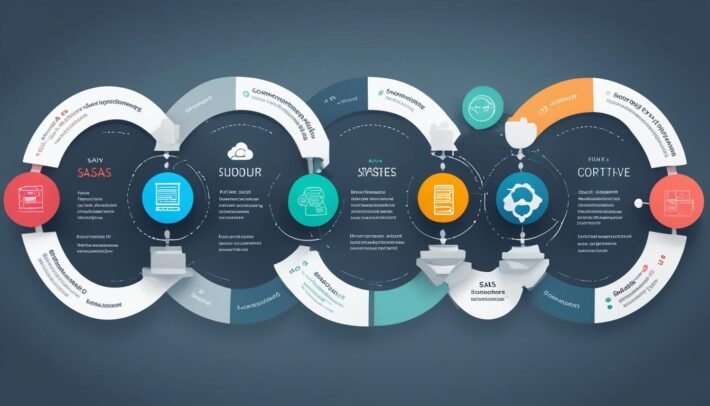Providing Exceptional Customer Support in SAAS

Customer support is an essential component of any business, and perhaps even more so in the Software-as-a-Service (SAAS) industry. As SAAS companies continue to grow and expand, providing exceptional customer support becomes a crucial factor in maintaining customer satisfaction and loyalty, as well as gaining an edge over the competition.
By prioritizing customer support best practices, SAAS businesses can create a customer-centric culture, develop efficient communication channels, proactively address customer needs, and continually improve support processes. In turn, these actions can lead to improved customer satisfaction, increased customer retention rates, and even brand advocacy.
Key Takeaways:
- Customer support is a vital component of SAAS businesses.
- Providing exceptional customer support can enhance customer satisfaction and loyalty.
- Customer-centric culture, effective communication channels, proactive customer support, and continual improvement are essential best practices to implement.
- Collecting feedback, measuring customer satisfaction, and building customer relationships are critical factors.
- Implementing customer support best practices can lead to increased brand advocacy.
Understanding the SAAS Customer Support Landscape
Providing exceptional customer support is paramount to the success of any SAAS business. However, the process of delivering top-notch customer support in the SAAS industry can be challenging due to the dynamic nature of the industry itself and the wide variety of customer needs, demands, and expectations.
Effective customer support in SAAS requires a nuanced understanding of the unique challenges that the industry presents, as well as the best practices and strategies that can help businesses overcome these challenges.
Challenges in SAAS Customer Support
One of the primary challenges in SAAS customer support is the need for real-time, round-the-clock support. As SAAS solutions are often used by companies globally, support must be available 24/7 to cater to customers from different time zones. This requires that businesses have adequate manpower and resources to provide prompt and responsive support.
In addition, the SAAS industry is constantly evolving, with changing technology, trends, and customer needs. This fast-paced environment demands that businesses stay up-to-date with the latest industry developments and adopt agile and innovative support processes to stay ahead of the competition.
Opportunities in SAAS Customer Support
Despite the challenges, the SAAS industry also presents unique opportunities for businesses to provide exceptional customer support. One such opportunity is the ability to collect vast amounts of customer data, which can be analyzed to gain valuable insights into customer needs, preferences, and pain points. This information can in turn be used to develop personalized support experiences that cater to the individual needs of each customer.
Another opportunity in the SAAS industry is the ability to leverage advanced support technologies such as artificial intelligence, chatbots, and automation to streamline support processes and enhance the overall customer experience.
Overall, understanding the customer support landscape in the SAAS industry is crucial for developing effective support strategies and creating a customer-centric support culture within the organization. It requires businesses to be adaptable, innovative, and responsive to evolving customer needs and demands.
Defining Customer Support Best Practices
Customer support is the backbone of every successful business, and SAAS is no exception. Implementing support best practices can help SAAS businesses provide exceptional service, resulting in increased customer satisfaction and loyalty. The following key elements and strategies can guide SAAS companies in defining their customer support best practices:
| Key Element | Strategy |
|---|---|
| Customer-centric approach | Align the entire team towards prioritizing customer satisfaction and create a support-focused culture. |
| Proactive support | Anticipate customer needs and address them before they become pain points. |
| Effective communication channels | Offer various communication channels, such as email, chat, or phone, to cater to different customers’ preferences. |
| Timely response | Set clear response time standards and provide timely and efficient customer support. |
| Comprehensive training and knowledge management | Equip support agents with comprehensive training and robust knowledge management systems to enhance their service quality. |
Implementing these practices can help SAAS businesses improve their customer support services, leading to increased customer satisfaction and loyalty. In the following sections, we will explore each of these practices in detail and discuss how they can be effectively implemented in your SAAS business.

Establishing a Customer-Centric Support Culture
Providing exceptional customer support requires more than just employing the right strategies, tools, and tactics. It requires fostering a customer-centric culture within the organization, where prioritizing customer satisfaction is at the heart of every decision and action. In a customer-centric support culture, the entire team is aligned towards creating a support-focused environment that prioritizes the needs and expectations of customers.
Creating and maintaining a customer-centric support culture starts with leadership. Leaders must demonstrate the organization’s commitment to exceptional customer support by setting a positive example, establishing clear expectations, and providing the necessary resources and support. By creating a supportive, customer-focused culture that promotes continuous learning and development, employees are more likely to take ownership of their roles and responsibilities to deliver customer-centric support.
Fostering a customer-centric culture also involves creating a collaborative work environment that encourages cross-functional teams to work together towards achieving common goals. By leveraging the collective strengths, skills, and expertise of different teams, organizations can create more integrated and comprehensive support solutions that meet the needs of customers more effectively.
Finally, creating a customer-centric support culture involves ongoing communication, training, and recognition. By regularly communicating the importance of customer satisfaction and the role of support in achieving it, employees are reminded of the urgency and importance of their work. Providing comprehensive training, knowledge management, and skills development opportunities can help employees develop the competencies required to deliver exceptional support. Regular recognition and rewards for exceptional performance can also help create a stronger customer-focused culture.
The Benefits of a Customer-Centric Support Culture:
- Increased customer satisfaction and loyalty
- Improved employee engagement and retention
- Reduced support costs and improved efficiency
- Greater innovation and agility
“A customer-centric culture means doing what is right for the customer, not what is easy or convenient for the organization.”
Developing Effective Communication Channels
SAAS businesses must prioritize effective communication channels when providing customer support. A range of channels is available, each with particular benefits and considerations:
| Channel | Benefits | Considerations |
|---|---|---|
| Phone Support | Personal touch and real-time assistance | Increased labor costs and potential wait times |
| Email Support | Flexible and asynchronous communication | Slower response time and potential for miscommunication |
| Live Chat | Real-time assistance with low wait times | Potential for reduced productivity and increased training needs |
| Self-Service Channels | Convenient and cost-effective assistance | Potential for limited functionality and reduced personalization |
Choosing the right communication channel depends on the specific needs and preferences of your customers. It is essential to understand your audience and their communication expectations to provide the best possible support experience.

Implementing a Multichannel Support Strategy
Implementing a multichannel support strategy can significantly enhance the customer experience and satisfaction. By combining different support channels, SAAS companies can provide their customers with convenient and accessible support whenever they need it.
SAAS customer service teams need to ensure that their customers can reach them through various channels such as email, phone calls, live chat, social media, self-help portals, and more. Offering multiple channels ensures that customers have a choice in reaching out to customer support, which can lead to higher satisfaction rates.
Furthermore, a multichannel strategy can help SAAS customer service agents manage and prioritize their tasks more efficiently. When a customer reaches out to support through any channel, the agent can access all previous interactions and history to provide a quicker and more personalized resolution.
When designing a multichannel strategy, it is essential to ensure that each channel works seamlessly with others, and all agents are trained to handle queries from different channels skillfully. Consistent branding and tone across all channels also reflect a professional image of the SAAS business.
Offering a variety of support channels is a best practice that can help SAAS companies build lasting and valuable relationships with their customers. By making support accessible and convenient, businesses can improve customer satisfaction, reduce churn rate, and build a positive reputation in their industry.
Setting Response Time Standards
Setting response time standards is a critical aspect of customer support best practices.Timely and efficient responses can significantly impact customer satisfaction. Customers expect quick and reliable solutions to their queries, issues, and concerns, and businesses that meet these expectations are more likely to retain happy customers and receive positive feedback.
One way to establish response time standards is to create a comprehensive framework that includes the following elements:
| Element | Description |
|---|---|
| Service level agreements (SLAs) | A documented agreement between the business and the customer that outlines the expected response times for different types of requests. |
| Automated responses | Acknowledgment messages to inform customers that their request has been received and is being reviewed, with a promise to provide an update within a specific time frame. |
| 24/7 availability | The ability to offer support around the clock, with dedicated teams or agents available to handle requests during non-business hours. |
The response time standards should be tailored to the specific needs and expectations of the business and its customers, based on factors such as the complexity of the product or service, the type of customer, and the urgency of the request.

Meeting response time standards requires effective communication channels and a dedicated team of support agents who are trained to handle customer requests efficiently and courteously. Specialized tools and technologies can also help automate processes and maximize response times, such as chatbots, routing software, and internal knowledge management systems.
By setting clear and achievable response time standards, businesses can build trust and confidence with their customers, enhance brand reputation, and drive long-term success.
Effective Training and Knowledge Management
In the SAAS industry, customers expect timely and efficient support to resolve their queries and issues. To meet these expectations, it is crucial to have a well-trained support team equipped with comprehensive knowledge management systems to ensure accurate and effective customer assistance.
Effective training programs are essential for developing the skills and knowledge of support agents to provide exceptional customer support. Training should focus on the understanding of the SAAS product, customer service skills, communication, and problem-solving abilities. Regular training sessions and continued education will keep the support team up to date with the latest product updates, features, and customer service best practices.
Furthermore, implementing a robust knowledge management system is imperative for improving response times and ensuring accuracy. A knowledge base allows support agents to access a pool of reliable information to assist customers quickly and efficiently. Additionally, it enables the sharing of knowledge and collaboration between the support team, leading to better customer experiences.
“Investing in comprehensive training and knowledge management systems will empower your support team to deliver exceptional customer support, leading to higher customer satisfaction and loyalty.”
Proactive Support and Anticipating Customer Needs
Providing exceptional customer support requires more than just reacting to customer issues in a timely manner. To truly stand out in the SAAS industry, companies must adopt a proactive approach to support that anticipates and addresses customer needs before they even arise. By doing so, they can significantly enhance the customer experience and build stronger relationships with their clients.
Identifying Customer Pain Points
To anticipate customer needs, companies must first identify pain points in their current support processes. This can be achieved by analyzing customer feedback and support metrics, such as response time and issue resolution rates. By understanding where customers are experiencing challenges, companies can implement solutions to preemptively address those concerns.
“Anticipating customer needs is the key to delivering exceptional support experiences. Our team proactively reaches out to customers who have experienced recurring issues to provide tailored solutions and prevent future occurrences.” – Jack Smith, Customer Support Manager at XYZ SAAS company
Personalizing Support Experiences
Proactive support also involves personalizing experiences for customers based on their unique needs and preferences. This can be achieved by leveraging customer data to anticipate their needs and curate personalized support experiences. For example, a company can track previously resolved issues and suggest relevant solutions to customers who experience similar problems in the future.
The Benefits of Proactive Support
Adopting a proactive approach to customer support yields numerous benefits for SAAS companies. By anticipating customer needs and addressing them proactively, companies can:
- Reduce the volume of support requests
- Enhance customer retention and loyalty
- Improve overall customer satisfaction
- Streamline support processes for increased efficiency
By prioritizing proactive support, SAAS companies can differentiate themselves from competitors and establish a reputation for delivering exceptional customer experiences.
Measuring Customer Satisfaction and Collecting Feedback
At the heart of customer support best practices lies the importance of customer satisfaction and feedback. Without knowing how customers feel about the support they receive, it’s impossible to make informed decisions and day-to-day improvements. In this section, we’ll explore the importance of measuring customer satisfaction and discuss effective methods for collecting feedback.
| Benefits of Measuring Customer Satisfaction | Effective Methods for Collecting Feedback |
|---|---|
| Create happy and loyal customers by addressing their needs and pain points. | Implement a Net Promoter Score (NPS) survey to gauge customer loyalty and likelihood to recommend. |
| Gain insights into customer expectations and areas of improvement for support processes. | Gather feedback through customer reviews on public forums and social media channels. |
| Measure the effectiveness of changes made to the support processes. | Encourage customers to share their thoughts through email surveys and live chat feedback forms. |
Implementing a customer feedback program allows SAAS businesses to not only measure customer satisfaction but also create a process for ongoing improvement. By collecting feedback directly from customers, organizations can adjust their products or services, recognizing customer needs, and align with support best practices.
The insights gathered from customer feedback can drive an organization’s continual improvement and iteration, ensuring that their support processes and services evolve along with customer expectations. By making data-driven decisions based on the feedback received, businesses can build trust and lasting relationships with customers.
Effective collection of customer feedback is a crucial component of exceptional customer support in the SAAS industry. By understanding the importance of customer satisfaction and gathering feedback, organizations can improve their support processes and create loyal and enthusiastic brand advocates.
Continual Improvement and Iteration
Providing exceptional customer support requires ongoing evaluation and improvement. By continually assessing support processes and identifying areas for optimization, SAAS businesses can enhance the overall customer experience and satisfaction. Adopting a proactive approach to support can not only resolve issues but also prevent them from arising in the first place.
Organizations with customer-centric cultures understand the significance of investing in the development of their support team. Ongoing training and knowledge management programs enable support agents to stay up-to-date with the latest technologies and customer needs. This ensures that they can provide expedient, accurate, and consistent support consistently. Encouraging and empowering support agents to go the extra mile for customers can make for a delightful customer experience.
The main goal of continual improvement and iteration is to create a positive impact on the customer’s experience- it’s a process, not an event.
Centralized communication platforms help organizations gather valuable insights into customer needs and perceptions. Through data-driven analytics, organizations can gain meaningful insights into customer feedback, and use this information to assess customer satisfaction and improve customer support processes. Continual improvement and iteration require businesses to prioritize an agile and adaptable approach. Providing frequent feedback and focusing on data-driven decision-making can help businesses to remain agile, and customer-focused.
Implementing best practices for customer support requires a sustained effort over time. While a priority in the short run, SAAS businesses must maintain consistent application of customer-centric policies for the long-term success. Focusing on best practices, observations and experimentation to avoid repeating mistakes, prioritization of frequent feedback, and being aware of common customer pain points will allow businesses to create a sustainable culture of customer-first thinking.
Building Customer Relationships and Advocacy
Exceptional customer support isn’t just about resolving issues, it’s also about building lasting relationships with your customers. When customers feel valued and appreciated, they’re more likely to stick with your SAAS company and even become advocates for your brand.
One way to build strong relationships is by providing personalized support experiences. This can be achieved by utilizing data and analytics to understand your customers’ needs and preferences, and tailoring your support interactions accordingly. Additionally, recognizing and rewarding loyal customers can go a long way in fostering advocacy.
Another effective strategy for building customer relationships is by creating a community around your SAAS product. This can be in the form of online forums, social media groups, or even in-person events. Encouraging customers to interact with one another and with your brand can help to build a sense of engagement and loyalty.
Finally, empowering your support team is crucial in building strong customer relationships. By providing ongoing training and resources, support agents can be equipped to provide exceptional service and build rapport with your customers.
By incorporating these customer support best practices, your SAAS company can go beyond simply solving problems and instead build strong customer relationships and advocacy.
Conclusion
In conclusion, providing exceptional customer support is crucial for SAAS businesses to thrive in a competitive market. By understanding the unique challenges and opportunities present in the SAAS customer support landscape, implementing customer support best practices, fostering a customer-centric culture, and utilizing effective communication channels, businesses can provide efficient and accessible support to their customers.
Setting clear response time standards, providing comprehensive training, being proactive in addressing customer needs, measuring satisfaction and feedback, and continually improving support processes can all contribute to creating loyal, enthusiastic brand advocates.
By prioritizing customer satisfaction and loyalty, SAAS businesses can differentiate themselves from competitors, build strong relationships with customers, and establish a reputation for exceptional service.
FAQ
What are customer support best practices?
Customer support best practices refer to the strategies and approaches that businesses adopt to provide exceptional support and assistance to their customers. These practices involve timely responses, effective communication, proactive support, and a customer-centric approach.
Why is customer support important in the SAAS industry?
Customer support is crucial in the SAAS industry because it plays a significant role in ensuring customer satisfaction and loyalty. SAAS businesses rely on subscription-based models, and providing exceptional support helps in reducing churn, increasing customer retention, and driving revenue growth.
How can SAAS companies establish a customer-centric support culture?
SAAS companies can establish a customer-centric support culture by fostering a mindset that prioritizes customer satisfaction, aligning the entire team towards this goal, and implementing processes and systems that consistently deliver high-quality support.
What are effective communication channels for SAAS customer support?
Effective communication channels for SAAS customer support include email, live chat, phone support, self-service knowledge bases, and social media. Each channel has its benefits, and businesses should consider their target audience and resources when selecting the appropriate channels.
What is a multichannel support strategy, and how can it benefit SAAS businesses?
A multichannel support strategy involves utilizing multiple support channels to provide a seamless and responsive customer experience. This approach enhances customer satisfaction by allowing them to choose their preferred channel and ensures that support is accessible across different platforms.
Why is setting response time standards important for customer support?
Setting clear response time standards is crucial as it establishes expectations for customers and helps in managing their experience. Timely responses demonstrate commitment and professionalism, leading to higher customer satisfaction and trust.
How can SAAS businesses provide effective training and knowledge management for customer support agents?
SAAS businesses can provide effective training and knowledge management for customer support agents by developing comprehensive training programs, utilizing internal knowledge bases, implementing ticketing systems, and facilitating continuous learning and development opportunities.
What is proactive support, and why is it important?
Proactive support involves anticipating customer needs and addressing potential issues before they arise. It enhances the customer experience by demonstrating attentiveness and responsiveness, leading to higher customer satisfaction, reduced support queries, and increased loyalty.
How can SAAS companies measure customer satisfaction and collect feedback?
SAAS companies can measure customer satisfaction and collect feedback through customer surveys, Net Promoter Score (NPS) assessments, user feedback forms, and social media monitoring. These methods provide valuable insights into customer experiences and help in improving support processes.
Why is continual improvement and iteration important in customer support?
Continual improvement and iteration are important in customer support as they allow businesses to adapt to changing customer needs and expectations. Regular evaluation and optimization of support processes ensure that they remain effective and aligned with evolving customer requirements.
How can exceptional customer support help in building customer relationships and advocacy?
Exceptional customer support helps in building strong customer relationships and advocacy by creating positive experiences, fostering trust, and demonstrating a commitment to resolving customer issues. Satisfied customers are more likely to become loyal advocates, recommending the brand to others.



